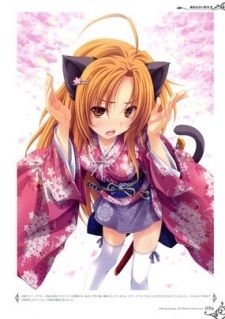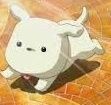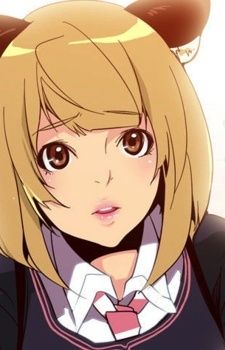
(This has been adapted from my reddit thread) When a person first starts out in the world, the only connections he or she makes are between the immediate family. The mom feeds, the dad protects, and the siblings watch over the new addition to the house. But at a certain point, new bonds must be made, not within the household but within society itself. These new, usually different people that are met more often than not become "friends." A friend is a confidant, a buddy, a guy or girl with which things are less serious and more fun. Sadly, even if such friends are found, theycan just as easily be lost. In Sora no Method, the idea of friendship is tested, and by the end, it becomes nothing more than a stranger. STORY Method begins with Nonoka, a middle schooler who is moving back to her childhood hometown after being away for some time. Upon arriving, a happy little girl named Noel appears to have been waiting for her for years, in the hopes that they can hang out once more. Something went terribly wrong as Method was being produced. Imagine a river, flowing endlessly and consistently. Eventually, it reaches the open ocean after much trekking and hardship. This is how drama is usually handled; stuff happens, drama ensues, build-up, and resolution. Now, imagine if every mile or so, a dam was built, providing less and less water the further along it went. And in the end, instead of reaching the ocean, it was funneled haphazardly toward a ravine to forever become lost. That is how the drama of Method is handled. Analogies aside, Method tackles its drama in a "stop-and-go" fashion. A problem is usually found from among the group, Nonoka tries to address it, and eventually solves the controversy. But it's always give and take. Where one set of issues is taken care of, a whole new set arises. It never feels as if any of the drama or any of the resolution amounts to anything significant. Characters employ physical abuse, miscommunication, avoidance, and literal refusal to unnecessarily ramp up the drama. What results is a plethora of melodramatic scenarios in which it is never quite clear if anything is ever truly being resolved. In fact, on multiple occasions, seemingly finished plot points are reinstated. The exact same drama unfolds as it had before, making the audience quite aware of the awkward repetition. In order to exacerbate the problems further, Method leaves many rather important questions left unanswered. Despite it being small in terms of a contextual universe, there are particular events that either receive no explanation or, for what is given, it isn't enough to justify what happens. Characters being able to find one another on a whim, how the saucer works, and how certain characters are able to remember certain events can be guessed at, but it's not so much clever interpretation as it is misplaced confusion. Even the overall theme receives a blow. Throughout the entire show, it runs with the idea of what being a friend and having them really means. A friend doesn't always have to be around; while they may go separate ways, two friends are usually so for life. Stuff can appear along the way that tests the waters, but good friends, no matter what may have happened in the past, remain so. That is to say, it's not the memories that matter but rather the relationship that does...or that is what we are lead to believe. The final two episodes reverse the message Method was formulating and sending. It instead latches onto the opposite venue; the memories are more important than the actual bond that is shared. The apparent shift in focus comes about due to another melodramatic moment and only serves to solidify how misguided the anime truly is. ANIMATION The only feature of Method that is praiseworthy is in its art and animation. The art is rather gorgeous. The backdrops are varied and filled with great lighting effects and detail. Colors are fresh and vibrant, giving the show a rather appealing look no matter where the situations are taking place. The locations vary nicely as well, with scenic beaches and gloomy lighthouses. It's always a feast for the eyes. The character designs are not as impressive as the art itself, but they do their job. The main cast is simple in appearance, with normal haircuts and normal outfits, usually resorting to their school uniform. Only Noel is given any uniqueness, with her light-blue hair, black and white attire, and child-like stature. The actual animation follows the art. The characters move quite fluidly at all times, whether alone or with multiple others on screen. Animation also exists for background and foreground objects, making the world look that much more alive. CHARACTERS Where the art excels, the characters plummet. Method's cast range from inconsequential to infuriating, and not even Noel's infinite cuteness can save them. One of the worst "main" characters I have ever seen lies with Koharu. While kind, she acts as a literal fifth-wheel to the brother and sister combo and the other two best friends. Outside of working at the local tourist shop or being nice to the other four, she serves no purpose. Without any amount of character development or usefulness besides being the last "friend" needed to summon the saucer, any other person could replace her. As the only male friend, Souta stands out slightly. A bit more rational, he has a need to escape his current life and try something new. He cares a lot for his sister and the people around him, despite his often mellow attitude. He works hard, no matter the subject, but is rather easy to tease. In the beginning, he appears to look out only for himself, not wanting to deal with any of the drama taking place around him. However, he learns through Noel that sometimes the best things in life are right next to you all along. Sadly, after the halfway point in the show, he loses what little relevancy he had, becoming almost as much of a side character as Koharu did. Yuzuki is an energetic young girl. When she sets her mind on a goal, she strives to accomplish it with as much gusto as she can muster. Overreacting, protesting, and simply having fun is what she is known for. Being the first real obstacle that Nonoka must overcome, Yuzuki almost always runs away from her problems. Her refusal to deal with anyone or at least listen to what others have to say makes her out to be quite difficult to deal with, and even more so to watch. She exemplifies the notion that a friend sometimes needs more than just words to get through. Arguably the most ridiculous cast member, Shione has her name shouted more times than one cares to hear. With a stoic appearance and a simple beauty about her, she remains entirely standoffish for nearly the whole season. Her signature headphones give her a literal and personified way to drown out the "noise" around her. She avoids the other members, especially Nonoka, as much as possible, causing an inability in any of the friends to rectify the situation with her. Shione's wishy-washy behavior manifests near the end, and her development causes her to completely contrast with who she was all along. And not just by a small amount; so much so that she becomes almost too sympathetic. Taking the lead, Nonoka is the childhood friend who is seen as ruining everything. Determined and kind, her mother taught her to always smile to spread happiness where needed. She hates seeing the people she held dear succumb to sadness, so she takes it mostly upon herself to fix the ties that were made between the four of them seven years ago. Even as the star, she never improves much as a character, with her feelings being known and shown at all points without much difference. She starts off being caring and thoughtful towards her friends, and she ends the exact same way. The only memorable cast member is potentially Noel. Innocent and cute beyond measure, she constantly seeks to be with the five kids who called her. Rather carefree, she simply wants nothing more than to see Nonoka and the gang happy. Impossible not to like, mysterious to a degree, and always there at the right place at the right time, Noel is "a diamond in the rough." Sadly, her character is treated rather lazily, making the impact of her inclusion within the story diminished due to the ending of the tale and her rushed transition from pure cuteness to emotionally aware. What's interesting is, with the exception of Noel, the more difficult the person was for Nonoka to befriend, the more development that character received. While this makes sense logically, it causes the problem shown here with the characters: some of the friends do close to nothing useful in regards to the narrative. Koharu and Souta receive little attention because they're stable, whereas Yuzuki and Shione are compromised. This doesn't work, because half the cast becomes unimportant. Yuzuki's and Shione's evolution as characters could have meant something, but the overextended drama relative to the events taking place outlined them as being quite irrational. What are left are both underdeveloped and unlikable characters. SOUND The OP's beginning piano and singing start it off on the right note. When the generic beat kicks in, the rest of the song falls flat, except for the final lyrics giving it a rather touching feeling. The ED is slightly better. Again, it starts off with instruments only, and is quite pleasant to hear. Following the beginning, the vocalist works well with the violin and trailing effects. While the beat usually leaves much to be desired, the singer does her best to make the song out to be better than what it is. The soundtrack is actually quite good. The little humming tune, the tapping-and-vocal arrangement during uneasy scenes, and the harp-with-tingling-chimes piece for the more melancholic ones are performed well. They add more to the show than the story and characters are able to produce. Voice-acting sees mostly average performances for the cast. A special shout-out goes to Inori Minase as Noel. ENJOYMENT One of the reasons why I picked this up from the beginning was partly due to it being an original and being a new studio's first work. It's unfortunate that the end product isn't as good as it could have been. The story and characters seem to be pieces to a puzzle. Yet, watching Nonoka get slapped (more than once, too) was less dramatic and more hilarious. Seeing Yuzuki run away every chance she got was annoying, not endearing. Watching Shione be good friends with Noel and nobody else was continuously perplexing. There are just too many moments jumbled next to one another to call the puzzle correctly put together. The only aspect making the anime tolerable was Noel. Her cute faces, constant smiling, and precious way of speaking provided some laughs and grins along the way. She in no way is capable of keeping the entire show afloat, but if she were not present at all, there would be absolutely nothing worthy coming from this one. As a new venture, Sora no Method was a gamble that failed miserably. The story and characters are nonsensical without a doubt. While the music and art are refined, there just isn't enough present to call this one anything but forgettable. SUMMARY Story: Terrible, melodramatic, unneeded confusion, clashing themes Animation: Good, nice art, okay character designs, good animation Characters: Terrible, a mix of underdeveloped and unlikable Sound: Fine, bad OP, okay ED, good soundtrack, okay VA work Enjoyment: Bad, Noel is the only reason to watch Final Score: 3/10











